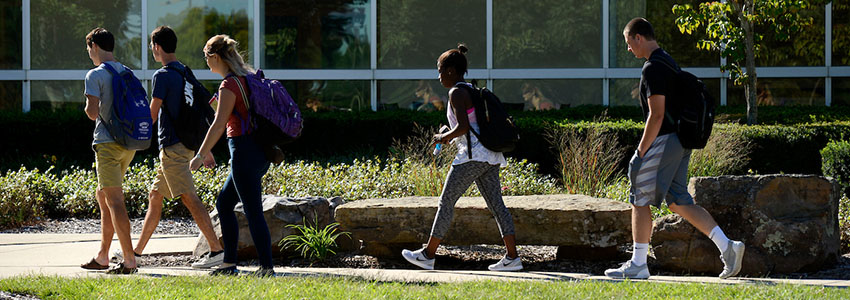The Department of Education recently published new regulations which affect students who repeat courses. These regulations may impact your financial aid eligibility and awards, including Pell Grant, SEOG Grant, Direct Loans, Federal Work-Study. Beginning with the Spring 2012 semester, regulations prevent the Financial Aid Office from paying for a course that has been passed and repeated more than one time. In order for a repeated course to be counted towards your enrollment status for financial aid purposes, you may only repeat a previously passed course once (a total of two attempts). If you enroll in a previously repeated and passed course for a third time, this course will not count towards your enrollment for financial aid purposes. Examples of repeated courses:
- Allowable: Repeated courses may be included if the student received an ‘F’ or ‘NC’ grade. There is no limit on the number of attempts allowable if the student does not receive a passing grade. Grades of A, B, C, D, P or CR (Credit) are considered passing grades.
- Allowable: Student is enrolled in 15 credit hours which includes 3 credits repeating a previously passed course. Because the student is enrolled in a minimum of 12 credits which are not repeats, the student’s financial aid eligibility is not impacted by the repeat.
- Not permissible: Student receives a D in a course and decides to repeat the course to improve his/her GPA. The student may repeat this passed course one time, but if the student wants to repeat it a second time, the second repeat would not count for financial aid eligibility.
Examples
Now, when counting credits to determine aid eligibility for that semester, many repeated classes will be excluded from the financial aid eligible credit count. This may mean less Pell Grant if the eligible credits are less than 12 credits, or no subsidized/unsubsidized loans if the financial aid eligible credits are less than 6 credits for undergraduate students (less than 5 for graduate students). Repeated credits that are determined to be ineligible for financial aid will also impact eligibility for scholarships and work-study positions.
- A student can be paid on a repeated course IF the class was never previously passed.
- A student can also be paid for repeating a previously passed course as long it is the first repeat of the course.
| Course | 1st Attempt | 2nd Attempt/first repeat | 3rd Attempt/second repeat | Is Class eligible for FA for the Enrolled Semester |
| Course 1 | F | D | Enrolled | No |
| Course 2 | C | Enrolled | Yes | |
| Course 3 | D | C | Enrolled | No |
| Course 4 | D | F | Enrolled | No |
| Course 5 | W | F | Enrolled | Yes |
Explanation of the Above Examples
- Credits are excluded from the financial aid eligible credits because it is the second time the course is being repeated and it was previously passed.
- Yes, these credits may be counted, even though it was previously passed, because it is the first time the course is being repeated.
- No, this course was previously passed and this is the third attempt. Two attempts is the maximum attempts these credits can count towards financial aid eligibility, because the course has been passed.
- No, the class credits are no longer considered for financial aid eligibility because it has been previously passed and this is the second time it is being repeated.
- Yes, because this course has never been passed so may still be counted towards financial aid eligible credits.
Details of the New Regulations
- Repeated enrollment that is not aid eligible will be excluded from the student’s enrollment status for the term.
- Federal Title IV financial aid will be recalculated based on the student’s adjusted enrollment status.
- This recalculation will be applied regardless of whether a student received aid for previous course enrollments.
- Some courses are repeatable per institution policy such as continuing research, thesis hours etc. and are not restricted by these regulations.
- Waitlisted courses do not count toward official enrollment status for financial aid purposes.
- All repeated courses do affect financial aid satisfactory academic progress calculations. A repeated course along with the original attempt must be counted as attempted credits.
The Office of Financial Assistance at the University of Illinois at Springfield will not pay for repeat classes for which an incomplete grade (‘I’) or deferred grade (‘DFR’) was previously assigned. All enrollments of a class will count toward the total number of attempted credit hours when calculating completion ratios and maximum time frames as they relate to satisfactory academic progress (refer to the UIS Satisfactory Academic Progress Policy for additional information).
